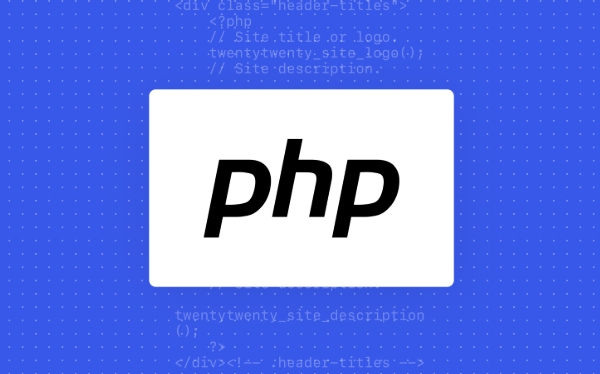To obtain the user's real IP address, multiple HTTP headers need to be checked first. 1. The function checks the headers such as HTTP_CLIENT_IP, HTTP_X_FORWARDED_FOR, and take the first valid IP; 2. Process multiple comma-separated IPs to verify their legitimacy; 3. If all headers are invalid, use REMOTE_ADDR; 4. For CDN environments such as Cloudflare, HTTP_CF_CONNECTING_IP needs to be processed separately; 5. Note that the header information may be forged and cannot be used for security control. This method is suitable for logging and trend analysis, but cannot guarantee 100% accuracy.

Obtaining user IP addresses is a common requirement in PHP, such as for scenarios such as logging, access control, or user geolocation analysis. However, because HTTP requests may pass through proxy or CDN, simple $_SERVER['REMOTE_ADDR'] cannot cover all cases. Below is a relatively comprehensive PHP function example that can handle multiple proxy situations to obtain the user's real IP.

Basic function: Try to get the user IP address
Here is a commonly used PHP function that checks multiple HTTP headers to get the user's real IP as much as possible:
function getUserIp()
{
foreach (array('HTTP_CLIENT_IP', 'HTTP_X_FORWARDED_FOR', 'HTTP_X_FORWARDED', 'HTTP_X_FORWARDED', 'HTTP_X_CLUSTER_CLIENT_IP', 'HTTP_FORWARDED_FOR', 'HTTP_FORWARDED', 'REMOTE_ADDR') as $key) {
if (!empty($_SERVER[$key])) {
$ip = $_SERVER[$key];
// Handle multiple comma-separated IPs, take the first if (strpos($ip, ',') !== false) {
$ip = exploit(',', $ip)[0];
}
// Verify that it is a legal IP address if (filter_var($ip, FILTER_VALIDATE_IP)) {
return trim($ip);
}
}
}
return 'Unknown';
} The idea of this function is: priority is to check the client IP that may be carried in the HTTP request header. If all are invalid, then use REMOTE_ADDR .

Note: Why do you need to check multiple header information?
HTTP requests may pass through intermediate layers such as CDN, reverse proxy, load balancer, etc. At this time, the IP of the original user will be placed in some HTTP headers, such as:
-
HTTP_X_FORWARDED_FOR: This is the most common proxy header, and the format is usually"客戶端IP, 代理1, 代理2". -
HTTP_CLIENT_IP: Some clients may set this header. -
HTTP_FORWARDED: The forwarding header defined by the RFC standard.
However, these headers can be forged, so be extra careful when using them, and it is best to combine them with other verification mechanisms.

Suggestions: Use scenarios and precautions
- Logging : Even if you cannot obtain the real IP 100%, you can record it for analysis of trends.
- Security restrictions : Do not rely on these headers alone for permission control, as they are easily bypassed.
- CDN environment : If your website uses CDN (such as Cloudflare), CDN usually sets the user IP in a specific header, such as
HTTP_CF_CONNECTING_IP, which needs to be processed separately. - IPv6 supports :
filter_var()function supports IPv6 address verification, so no additional judgment is required.
Extension: In combination with CDN processing methods (such as Cloudflare)
If you are using Cloudflare, you can add a judgment on HTTP_CF_CONNECTING_IP :
function getUserIp()
{
// Cloudflare specific header if (!empty($_SERVER['HTTP_CF_CONNECTING_IP'])) {
$ip = $_SERVER['HTTP_CF_CONNECTING_IP'];
if (filter_var($ip, FILTER_VALIDATE_IP)) {
return $ip;
}
}
foreach (array('HTTP_CLIENT_IP', 'HTTP_X_FORWARDED_FOR', 'HTTP_X_FORWARDED', 'HTTP_X_FORWARDED', 'HTTP_X_CLUSTER_CLIENT_IP', 'HTTP_FORWARDED_FOR', 'HTTP_FORWARDED', 'REMOTE_ADDR') as $key) {
if (!empty($_SERVER[$key])) {
$ip = $_SERVER[$key];
if (strpos($ip, ',') !== false) {
$ip = exploit(',', $ip)[0];
}
if (filter_var($ip, FILTER_VALIDATE_IP)) {
return trim($ip);
}
}
}
return 'Unknown';
}Basically that's it. Although this function cannot obtain the user IP 100% accurately, it is enough in most scenarios. The key is to understand the origins and limitations of each situation.
The above is the detailed content of php function to get user IP address. For more information, please follow other related articles on the PHP Chinese website!

Hot AI Tools

Undress AI Tool
Undress images for free

Undresser.AI Undress
AI-powered app for creating realistic nude photos

AI Clothes Remover
Online AI tool for removing clothes from photos.

Clothoff.io
AI clothes remover

Video Face Swap
Swap faces in any video effortlessly with our completely free AI face swap tool!

Hot Article

Hot Tools

Notepad++7.3.1
Easy-to-use and free code editor

SublimeText3 Chinese version
Chinese version, very easy to use

Zend Studio 13.0.1
Powerful PHP integrated development environment

Dreamweaver CS6
Visual web development tools

SublimeText3 Mac version
God-level code editing software (SublimeText3)

Hot Topics
 php regex for password strength
Jul 03, 2025 am 10:33 AM
php regex for password strength
Jul 03, 2025 am 10:33 AM
To determine the strength of the password, it is necessary to combine regular and logical processing. The basic requirements include: 1. The length is no less than 8 digits; 2. At least containing lowercase letters, uppercase letters, and numbers; 3. Special character restrictions can be added; in terms of advanced aspects, continuous duplication of characters and incremental/decreasing sequences need to be avoided, which requires PHP function detection; at the same time, blacklists should be introduced to filter common weak passwords such as password and 123456; finally it is recommended to combine the zxcvbn library to improve the evaluation accuracy.
 How to combine two php arrays unique values?
Jul 02, 2025 pm 05:18 PM
How to combine two php arrays unique values?
Jul 02, 2025 pm 05:18 PM
To merge two PHP arrays and keep unique values, there are two main methods. 1. For index arrays or only deduplication, use array_merge and array_unique combinations: first merge array_merge($array1,$array2) and then use array_unique() to deduplicate them to finally get a new array containing all unique values; 2. For associative arrays and want to retain key-value pairs in the first array, use the operator: $result=$array1 $array2, which will ensure that the keys in the first array will not be overwritten by the second array. These two methods are applicable to different scenarios, depending on whether the key name is retained or only the focus is on
 How to handle File Uploads securely in PHP?
Jul 08, 2025 am 02:37 AM
How to handle File Uploads securely in PHP?
Jul 08, 2025 am 02:37 AM
To safely handle PHP file uploads, you need to verify the source and type, control the file name and path, set server restrictions, and process media files twice. 1. Verify the upload source to prevent CSRF through token and detect the real MIME type through finfo_file using whitelist control; 2. Rename the file to a random string and determine the extension to store it in a non-Web directory according to the detection type; 3. PHP configuration limits the upload size and temporary directory Nginx/Apache prohibits access to the upload directory; 4. The GD library resaves the pictures to clear potential malicious data.
 PHP Variable Scope Explained
Jul 17, 2025 am 04:16 AM
PHP Variable Scope Explained
Jul 17, 2025 am 04:16 AM
Common problems and solutions for PHP variable scope include: 1. The global variable cannot be accessed within the function, and it needs to be passed in using the global keyword or parameter; 2. The static variable is declared with static, and it is only initialized once and the value is maintained between multiple calls; 3. Hyperglobal variables such as $_GET and $_POST can be used directly in any scope, but you need to pay attention to safe filtering; 4. Anonymous functions need to introduce parent scope variables through the use keyword, and when modifying external variables, you need to pass a reference. Mastering these rules can help avoid errors and improve code stability.
 Commenting Out Code in PHP
Jul 18, 2025 am 04:57 AM
Commenting Out Code in PHP
Jul 18, 2025 am 04:57 AM
There are three common methods for PHP comment code: 1. Use // or # to block one line of code, and it is recommended to use //; 2. Use /.../ to wrap code blocks with multiple lines, which cannot be nested but can be crossed; 3. Combination skills comments such as using /if(){}/ to control logic blocks, or to improve efficiency with editor shortcut keys, you should pay attention to closing symbols and avoid nesting when using them.
 Tips for Writing PHP Comments
Jul 18, 2025 am 04:51 AM
Tips for Writing PHP Comments
Jul 18, 2025 am 04:51 AM
The key to writing PHP comments is to clarify the purpose and specifications. Comments should explain "why" rather than "what was done", avoiding redundancy or too simplicity. 1. Use a unified format, such as docblock (/*/) for class and method descriptions to improve readability and tool compatibility; 2. Emphasize the reasons behind the logic, such as why JS jumps need to be output manually; 3. Add an overview description before complex code, describe the process in steps, and help understand the overall idea; 4. Use TODO and FIXME rationally to mark to-do items and problems to facilitate subsequent tracking and collaboration. Good annotations can reduce communication costs and improve code maintenance efficiency.
 How Do Generators Work in PHP?
Jul 11, 2025 am 03:12 AM
How Do Generators Work in PHP?
Jul 11, 2025 am 03:12 AM
AgeneratorinPHPisamemory-efficientwaytoiterateoverlargedatasetsbyyieldingvaluesoneatatimeinsteadofreturningthemallatonce.1.Generatorsusetheyieldkeywordtoproducevaluesondemand,reducingmemoryusage.2.Theyareusefulforhandlingbigloops,readinglargefiles,or
 How to create an array in php?
Jul 02, 2025 pm 05:01 PM
How to create an array in php?
Jul 02, 2025 pm 05:01 PM
There are two ways to create an array in PHP: use the array() function or use brackets []. 1. Using the array() function is a traditional way, with good compatibility. Define index arrays such as $fruits=array("apple","banana","orange"), and associative arrays such as $user=array("name"=>"John","age"=>25); 2. Using [] is a simpler way to support since PHP5.4, such as $color






